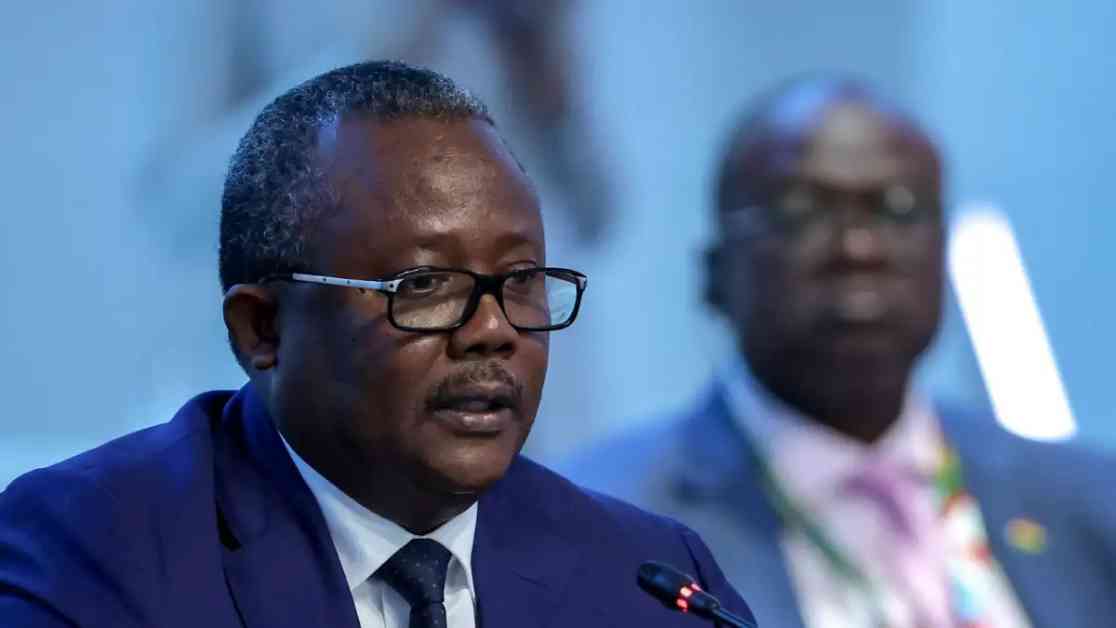Guinea-Bissau President Umaro Sissoco Embalo has shocked the nation by announcing that he will not seek re-election in the 2025 presidential elections. This unexpected decision, revealed to journalists after a cabinet meeting, signifies a significant turning point in the country’s political landscape.
Embaló, whose controversial election in 2019 sparked widespread protests, justified his choice by citing the advice of his wife. This personal reason for stepping down contrasts sharply with the tense political climate that has prevailed in Guinea-Bissau since he assumed office. Following his inauguration in February 2020, there were months of unrest, with his main rival, Domingos Simoes Pereira, still refusing to acknowledge his victory, alleging electoral fraud.
Despite his withdrawal from the presidential race, Embaló did not hesitate to make controversial statements regarding his succession. He adamantly opposed the idea of certain political rivals taking his place, specifically naming Domingos Simoes Pereira, Nuno Gomes Nabiam, and Braima Camara. The outgoing president even used harsh language, stating that he would not be « replaced by a criminal, » although he did not specify to whom he was referring.
Political Turmoil and Challenges
Guinea-Bissau has a history of political instability and corruption, which has hindered its development and economic progress. The country has experienced numerous coups and military interventions since gaining independence from Portugal in 1973. The presence of drug trafficking and organized crime further complicates the political landscape, making governance a challenging task for any leader.
Embaló’s tenure as president has been marred by accusations of corruption and authoritarian behavior. Critics have accused him of undermining democratic institutions and concentrating power in the hands of a few loyalists. His decision not to seek re-election may be seen as an attempt to avoid further scrutiny and criticism from the international community.
Impact on the Future of Guinea-Bissau
The announcement of Embaló’s decision not to run for a second term has raised questions about the future of Guinea-Bissau and the stability of its political system. With the country already facing economic challenges and social unrest, the prospect of a contentious presidential election looms large. The lack of a clear successor to Embaló could lead to a power vacuum and further political turmoil.
The international community will be closely monitoring the situation in Guinea-Bissau, as stability in the region is crucial for security and development. The United Nations and other organizations have been actively engaged in supporting democratic governance and the rule of law in the country. The upcoming presidential election will be a critical test of Guinea-Bissau’s commitment to democracy and respect for human rights.
Challenges for the Next President
Whoever succeeds Umaro Sissoco Embaló as president of Guinea-Bissau will face significant challenges in addressing the country’s pressing issues. From poverty and unemployment to corruption and political instability, the new leader will need to demonstrate strong leadership and a commitment to reform. Building trust with the population and fostering national unity will be crucial for achieving lasting peace and prosperity.
The next president will also need to navigate Guinea-Bissau’s complex regional and international relations. The country’s strategic location on the West African coast makes it a key player in regional affairs, especially in the fight against transnational crime and terrorism. Strengthening ties with neighboring countries and international partners will be essential for promoting peace and security in the region.
In conclusion, President Umaro Sissoco Embaló’s decision not to seek re-election in Guinea-Bissau has significant implications for the country’s political future. As the nation prepares for the 2025 presidential elections, it faces a crucial moment of transition and uncertainty. The challenges ahead will require strong leadership, dedication to democratic values, and a commitment to addressing the root causes of instability. Only time will tell how Guinea-Bissau navigates this critical juncture in its history.

